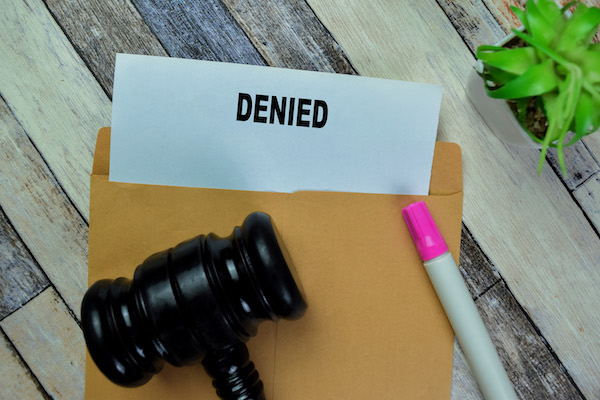“The CAFC ‘standard makes it virtually impossible to obtain narrower claims in reissue by narrowing from a disclosed broad embodiment (a genus), to a narrower sub-embodiment (a species,’ said the petition.”
 Just a few weeks after Google waived its right to respond, the Supreme Court denied a petition challenging a U.S. Court of Appeals for the Federal Circuit (CAFC) decision that held a Texas district court erred in ruling against the search engine and tech behemoth.
Just a few weeks after Google waived its right to respond, the Supreme Court denied a petition challenging a U.S. Court of Appeals for the Federal Circuit (CAFC) decision that held a Texas district court erred in ruling against the search engine and tech behemoth.
The U.S. District Court for the Eastern District of Texas found the inventors of a method for protecting computers from malware—Alfonso Cioffi and Allen Rozman (the patent is now assigned to Melanie, Megan and Morgan Rozman)—had proven that Google’s Chrome web browser infringed their reissue patents RE43,500, RE43,528, and RE43,529 and that the claims were not invalid. After a first time at the Federal Circuit in which the case was remanded to the district court, a jury awarded Cioffi, et. al. $20 million in past damages and the district court in post-trial review rejected Google’s “original patent defense.”
Google had argued that the claims were invalid under the “original patent requirement” because they contained reissue claims not disclosed in the original patent. But the district court said “it was undisputed that a ‘web browser process’ was a species of both a ‘logical process’ and ‘interactive network process,’ and the original U.S. Patent No. 7,484,247, titled System and Method for Protecting a Computer System From Malicious Software,” described the ‘interactive network process’ architecture in appropriate detail.”
On appeal to the CAFC, however, the Federal Circuit panel said that “because the exact words ‘web browser process’ did not appear in the specification and the evidence did not show that ‘the terms ‘interactive network process’ and ‘web browser process’ are synonymous or otherwise equivalent in meaning,’” the disclosure was insufficient.
The inventors’ Supreme Court petition argued, among other points, that the new standard essentially forecloses reissue of genus claims. It said the CAFC’s view that “[t]here must be an ‘express disclosure’ of the ‘exact embodiment claimed on reissue’…. far exceeds the standard set in U.S. Industrial Chemical, Inc. [v. Carbide & Carbon Chemicals, Corp., 315 U.S. 668, 676 (1942)] conflicts with decades of Federal Circuit precedent predating Antares [Pharma, Inc. v. Medac Pharma Inc.], and finds no basis in the reissue statute, 35 U.S.C. § 251.”
Antares is a 2014 Federal Circuit decision holding that safety features “serially mentioned as part of the broader disclosure” did not satisfy the original patent requirement. Cioffi, et. al. claimed in their petition that Antares “ratcheted up this Court’s standard for broadening reissue, holding that ‘the specification must clearly and unequivocally disclose the newly claimed invention as a separate invention.’” The inventors were asking the Court to consider overruling Antares and its progeny and to restore what the petition claimed is a 150-year standard of permitting inventors to correct issued patent claims through reissue.
The CAFC “standard makes it virtually impossible to obtain narrower claims in reissue by narrowing from a disclosed broad embodiment (a genus), to a narrower sub-embodiment (a species) – a point made plain by the instant case where the Inventors narrowed from a broader disclosed embodiment to a narrower species,” said the now-rejected petition.
Image Source: Deposit Photos
Author: olanstock
Image ID: 652924916

![[IPWatchdog Logo]](https://ipwatchdog.com/wp-content/themes/IPWatchdog%20-%202023/assets/images/temp/logo-small@2x.png)

![[Advertisement]](https://ipwatchdog.com/wp-content/uploads/2024/04/UnitedLex-May-2-2024-sidebar-700x500-1.jpg)
![[Advertisement]](https://ipwatchdog.com/wp-content/uploads/2024/05/Quartz-IP-May-9-2024-sidebar-700x500-1.jpg)
![[Advertisement]](https://ipwatchdog.com/wp-content/uploads/2024/04/Patent-Litigation-Masters-2024-sidebar-700x500-1.jpg)

![[Advertisement]](https://ipwatchdog.com/wp-content/uploads/2021/12/WEBINAR-336-x-280-px.png)
![[Advertisement]](https://ipwatchdog.com/wp-content/uploads/2021/12/2021-Patent-Practice-on-Demand-recorded-Feb-2021-336-x-280.jpg)
![[Advertisement]](https://ipwatchdog.com/wp-content/uploads/2021/12/Ad-4-The-Invent-Patent-System™.png)







Join the Discussion
3 comments so far.
Anon
November 14, 2023 11:53 amTFCFM,
Your hobby horse mantra is noted.
TFCFM
November 14, 2023 10:43 amThe case seems to stand for the less-than-astounding proposition that “an applicant must disclose what (s)he wishes to claim.”
I hope no one here is surprised by this revelation. (Ignoring anyone who wishes to assert that disclosing the phrase “anything and everything that works, whether I’ve invented it or not” amounts to a sufficient “disclosure” of anything and everything that is later discovered by others to be workable.)
Kant
November 13, 2023 04:28 pmWould a claim reciting an ‘interactive network process’ have been valid and infringed?